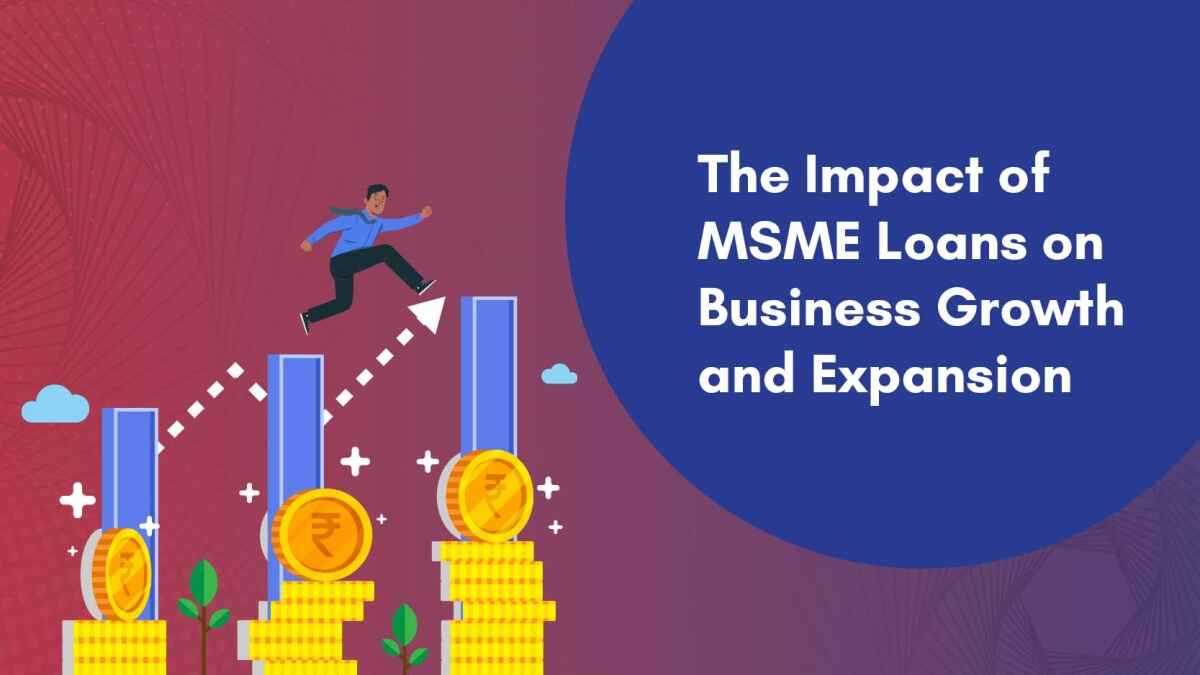Special Offers




Special Offers




03-Jul-2023 | MSME

Micro, small and medium-sized enterprises (MSMEs) play a vital role in driving economic growth and development in any country. However, limited access to finance often poses a significant challenge for these businesses to expand their operations and reach their full potential. In recent years, the emergence of micro, small, and medium enterprise (MSME) loans has provided a lifeline for such businesses, facilitating their growth and expansion. This article explores the impact of MSME loan on business growth, highlighting the various ways in which these loans empower SMEs to thrive in a competitive marketplace.
Access to capital is one of the primary constraints faced by MSMEs. Lack of funds prevents them from investing in new technologies, expanding their production capacities, or exploring new markets. MSME loans bridge this gap by providing the necessary financial resources to SMEs, enabling them to make vital investments. With increased capital availability, businesses can upgrade their infrastructure and purchase new machinery, ultimately enhancing their productivity and competitiveness.
MSME loans empower businesses to seize expansion opportunities that would otherwise be unattainable. Whether it is opening new branches, entering new markets, or diversifying product lines, these loans provide the necessary capital to fuel such endeavours. Expansion often leads to increased market share, improved brand recognition, and economies of scale, resulting in long-term sustainability and profitability.
In today's rapidly evolving business landscape, innovation and technological advancement are key drivers of success. MSME loans play a crucial role in fostering innovation by providing funds for research and development activities, the adoption of cutting-edge technologies, and the implementation of efficient processes. By embracing innovation, MSMEs can stay ahead of the curve, differentiate themselves from competitors, and cater to evolving customer demands.
MSMEs are significant contributors to job creation and economic development. MSME loans not only support existing businesses but also pave the way for new enterprises to emerge. By expanding operations, businesses require additional manpower, leading to job creation and reduced unemployment rates. Moreover, when MSMEs thrive, they contribute to the overall economic growth of a nation through increased tax revenues, enhanced local supply chains, and the development of ancillary industries.
Obtaining an MSME loan necessitates proper financial planning and documentation. To be eligible for such loans, business owners must understand financial statements, cash flow management, and risk assessment. Consequently, the process of applying for and managing MSME loans helps improve financial literacy and business acumen among entrepreneurs. This knowledge empowers business owners to make informed decisions, develop effective strategies, and navigate the complexities of the financial landscape.
MSME loans often come bundled with capacity building programs and skill development initiatives. Financial institutions and government agencies provide training and workshops to help entrepreneurs enhance their managerial skills, improve marketing techniques, and strengthen their overall business acumen. These programs equip MSME owners with the knowledge and tools necessary to effectively manage their businesses, ensuring sustainable growth and expansion.
MSME loans play a crucial role in promoting inclusivity and empowering underrepresented groups, such as women and minority-owned businesses. Access to affordable financing enables these entrepreneurs to overcome systemic barriers and realise their entrepreneurial dreams. By providing loans specifically tailored to the needs of these businesses, financial institutions and governments contribute to fostering a more equitable and diverse business landscape.
MSME loans can serve as a safety net during challenging times, helping businesses navigate financial vulnerabilities. Whether it is coping with unexpected expenses, managing cash flow fluctuations, or recovering from a crisis, having access to a loan can provide the necessary support to stabilise operations and prevent business closures. By providing timely financial assistance, MSME loans contribute to the resilience of small and medium-sized enterprises.
Obtaining an MSME loan often involves engagement with financial institutions, industry experts, and business mentors. This interaction opens up opportunities for collaboration and networking, enabling MSMEs to access valuable resources, industry insights, and potential partnerships. Collaborative efforts can lead to knowledge sharing, joint ventures, and enhanced market positioning, further fueling business growth and expansion.
MSME loans can have a positive impact on environmental and social sustainability. Financial institutions increasingly emphasise responsible lending practices, encouraging MSMEs to adopt eco-friendly technologies, reduce their carbon footprint, and promote social responsibility. MSME loans that prioritise sustainability criteria provide businesses with the means to invest in renewable energy, waste management systems, ethical supply chains, and social impact initiatives, aligning business growth with environmental and societal well-being.
MSME loans have revolutionised the business landscape by providing much-needed financial support to micro, small and medium-sized enterprises. By enhancing capital availability, facilitating business expansion, fostering innovation, creating jobs, and promoting financial literacy, these loans empower MSMEs to unlock their growth potential and contribute to economic development. Additionally, it is essential for business owners to conduct thorough research, develop robust business plans, and utilise the borrowed funds strategically to maximise the impact of MSME loans on their growth and expansion. With continued support and investment, MSMEs can become the backbone of a thriving economy, fostering innovation, creating employment opportunities, and driving sustainable development.